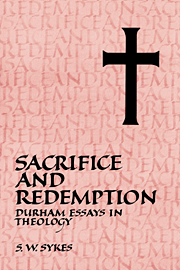Book contents
- Frontmatter
- Contents
- List of contributors
- Prefatory note
- Introduction
- PART I
- 1 Sacrifice and holiness
- 2 Sacrifice and world order: some observations on ben Sira's attitude to the temple service
- 3 Paul's understanding of the death of Jesus as sacrifice
- 4 Hebrews: the final sacrifice
- 5 St Athanasius on Christ's sacrifice
- 6 The doctrine of sacrifice: Augustine and the Latin patristic tradition
- 7 Sacrifice in the early East Syrian eucharistic tradition
- PART II
- PART III
- PART IV
- Index of biblical and ancient references
- Index of persons
6 - The doctrine of sacrifice: Augustine and the Latin patristic tradition
Published online by Cambridge University Press: 10 March 2010
- Frontmatter
- Contents
- List of contributors
- Prefatory note
- Introduction
- PART I
- 1 Sacrifice and holiness
- 2 Sacrifice and world order: some observations on ben Sira's attitude to the temple service
- 3 Paul's understanding of the death of Jesus as sacrifice
- 4 Hebrews: the final sacrifice
- 5 St Athanasius on Christ's sacrifice
- 6 The doctrine of sacrifice: Augustine and the Latin patristic tradition
- 7 Sacrifice in the early East Syrian eucharistic tradition
- PART II
- PART III
- PART IV
- Index of biblical and ancient references
- Index of persons
Summary
Thus the true sacrifice is offered in every act which is designed to unite us to God in a holy fellowship, every act, that is, which is directed to that Final Good which makes possible our true felicity.
This familiar, and comprehensive, definition of sacrifice is typical of Augustine's thought: he sees it as an action directed to union with God, which alone makes us truly happy. The eudaemonistic element in this definition is characteristically Augustinian: although Augustine has generally little concern for the transitory happiness of the present age (‘in huius vitae infelicitate’), in his desire for eternal beatitude he is a thorough hedonist. ‘Nulla est homini causa philosophandi nisi ut beatus sit’ – the only purpose man has in philosophizing is the attainment of happiness. Yet Augustine is clear that happiness without God is impossible: ‘that which makes man happy is the Supreme Good itself. Furthermore, the only way to attain to the Supreme Good is through the mediation of the God-man, Jesus Christ. From this it follows inevitably that Augustine's approach to sacrifice will be determined by his christocentricity and that he will, without hesitation, accept the earlier tradition which understood the eucharist, the great action of Christian unity, in sacrificial terms. Not every sacrifice, in Augustine's theology, is the eucharist; but every eucharist is a sacrifice.
It is very easy, when dealing with Augustine or with any great thinker, to overestimate his originality and to neglect his debt to the past; but Augustine would have been the first to reject any suggestion that he sought to introduce new doctrine, like some theological Paracelsus burning the books of his predecessors and making a fresh start.
- Type
- Chapter
- Information
- Sacrifice and RedemptionDurham Essays in Theology, pp. 101 - 117Publisher: Cambridge University PressPrint publication year: 1991



